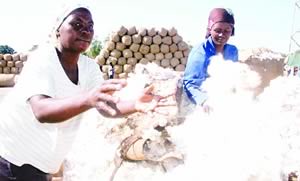
Zimbabwe cotton farmers earned from this year's yield according to a recent article in the state newspaper The Herald. The land redistribution program in this Southern African state has provided farms to people dispossessed by colonialism., a photo by Pan-African News Wire File Photos on Flickr.
Editorial Comment: Counting gains of the land reform
Saturday, 26 January 2013 00:00
Zimbabwe Herald
When Zimbabwe embarked on a drive to reclaim its land around 1998 from the largely white commercial farmers, opponents of the empowerment programme, who viewed white farmers as the only human specie given to farming, predicted the collapse of the agricultural sector.
Indigenous people were labelled lazy and incompetent, whose only claim to the land was that of being farm workers and not farmers.
To detractors of land reform, the parcelling out of productive land to thousands of hitherto landless Zimbabweans meant the country would be plunged into years of food shortages.
What the critics of the land reform chose to ignore is the fact that Zimbabweans were inherently farmers and that the bulk of maize output during the years white farmers dominated the farming landscape came from communal and small scale farmers.
This is a fact that no one could doubt since the statistics as provided by Agritex were there for everyone to peruse.
We never doubted the potential in us as Zimbabweans and as farmers to productively use the land that we were reclaiming from those that had been holding it on our behalf.
White farmers were simply landholders and we were the real owners of the land.
That we had immense potential, knowledge and skill to turn the vast tracts of land that the white farmers were leaving lying idle, into greenbelts, was never in doubt.
We were the same people working on the farms held by white farmers who were involved into crop and livestock production and so there was nothing in agriculture that we could not do.
We knew right from the start of land reform that teething challenges would be experienced as the owners of the land settle on the farms and mobilise resources to get on with the business of farming.
Those that have studied entrepreneurship will tell you that in any business, start-up challenges are always there and during that time production and or volumes always suffer.
What Western academics, researchers and journalists, for long fierce critics of our land reform have started saying now, is what we have always known.
We really do not need to wait to be told by them that our land reform programme is a big success.
We knew right from the start that despite the problems associated with moving on to a new place, settling and resource mobilisation, land reform would eventually be an envy of those who only yesterday had written off indigenous farmer’s capability to productively use the land.
There is no way the land reform would have flopped as had been hugely anticipated by critics since it meant opening up more land that white farmers had not be using to production.
The land under cultivation increased tremendously and so was the number of farmers taking up the land.
Where a mere 4 000 white farmers occupied vast tracts of land, measuring millions of hectares, now over 300 000 indigenous farmers are proud owners of the land pushing production back to the levels of the late 1990s.
It is, of course, refreshing that those that once wished us evil now realise they cannot forever put a good man down.
We are happy they have come out in the open to acknowledge that our crop production has massively increased despite the challenges the farmers have faced owing to the illegal sanctions imposed on the country by Britain, the EU and the US.
It has never been a secret that our land reform, alongside the indigenisation policy, is a tool deliberately designed to empower the majority of Zimbabweans.
We wonder what those who predicted the collapse of our agriculture would have to say now given the successes our farmers have scored since taking up the farms.
No comments:
Post a Comment